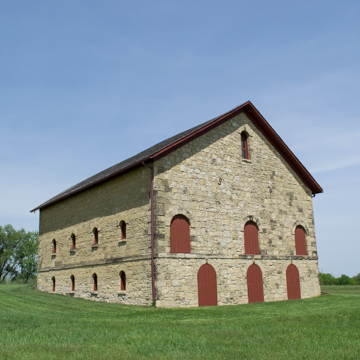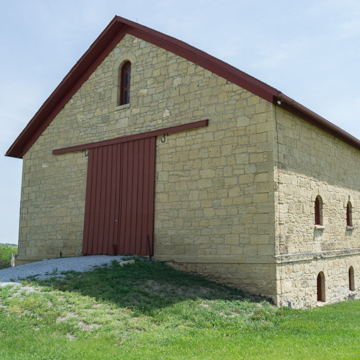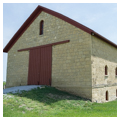You are here
Filley Stone Barn
The Elijah Filley Stone Barn is a rare specimen of an early Nebraska farm building, the only structure remaining from the Cottage Hill Farm Filley established in 1867. Filley and his family lived in a tent for the year it took them to build their substantial house with limestone taken from the property. At a time when settlers more generally lived in sod houses or dugouts, it was unusual to build a house of such a permanent material. Using limestone for the barn also deviated from normal practice, but Filley viewed its construction an opportunity for economic empowerment. The barn was finished in 1874, a difficult year for Midwestern farmers who were confronting a severe drought, a grasshopper invasion, and general crop failure. Many were in need of work; the most desperate were abandoning their farms. By building his barn in stone, and hiring jobless men to work on it, Filley provided financial support that helped his neighbors weather the devastation.
Filley’s is a bank barn that makes good use of the site’s topography: it is cut into the sloping hillside allowing grade access to the second story on the uphill side and first floor access on the downhill side. The barn’s exterior bearing walls are 24-inch-thick rough-cut limestone; inside are two rows of internal stone piers that support a floor and roof system of heavy-timber framing. The corners of the barn have carefully cut quoins. Window and door openings are spanned with arches except for a large rectangular opening at the gable end of the second floor that allowed wagons to enter. The barn’s design accommodated a variety of functions. Cattle and oxen were housed on the lower level. Horses, wagons, and grain bins occupied the second level; there were two levels of hay storage above the second floor.
Filley made significant contributions to the agricultural, commercial, social, and political development of southeastern Nebraska. A leading farmer, he was inducted into the Nebraska Hall of Agricultural Achievement in 1924. His cattle business became a large feeding, breeding, and freighting operation that eventually led to the founding of a nearby town named Filley in his honor. He was also actively engaged in a variety of political activities including serving as Gage County Commissioner, State Representative, and State Senator.
In 1978 the barn was willed to the Gage County Historical Society along with several acres of surrounding land. The society maintains the barn, offering group tours and sponsoring historical programs and demonstrations.
References
Murphy, Dave, "Elijah Filley Stone Barn," Gage County, Nebraska. National Register of Historic Places Inventory-Nomination Form, 1976. National Park Service, U.S. Department of the Interior, Washington, D.C.
Writing Credits
If SAH Archipedia has been useful to you, please consider supporting it.
SAH Archipedia tells the story of the United States through its buildings, landscapes, and cities. This freely available resource empowers the public with authoritative knowledge that deepens their understanding and appreciation of the built environment. But the Society of Architectural Historians, which created SAH Archipedia with University of Virginia Press, needs your support to maintain the high-caliber research, writing, photography, cartography, editing, design, and programming that make SAH Archipedia a trusted online resource available to all who value the history of place, heritage tourism, and learning.





















